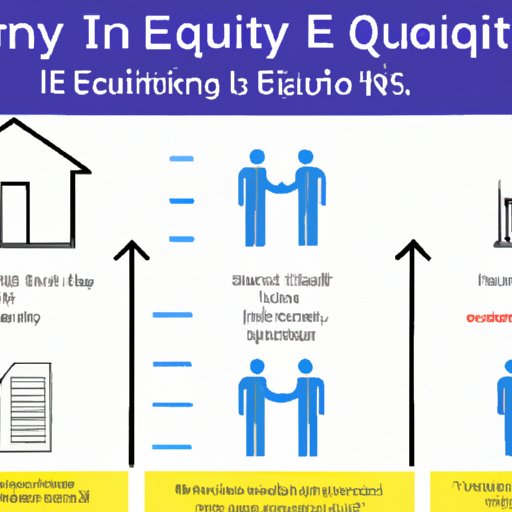Introduction
Equity is a term used in finance and accounting to refer to the ownership interest that an individual or company holds in a business. Equity investing involves purchasing stocks or shares in a company, with the aim of generating profits from their future growth. Equity investors are typically interested in long-term gains and dividends, as opposed to short-term capital gains. Equity investing can be a lucrative endeavor for those willing to take on the risk associated with it.

Explaining Equity: A Comprehensive Guide to Understanding How Equity Works
Equity plays an important role in the financial markets and understanding how it works is essential for any investor. The following sections will provide a comprehensive guide to understanding equity and its role in investing.
What is Equity?
Equity is defined as the value of a company’s assets minus its liabilities. When equity is invested in a company, the investor owns a portion of the company and has a claim to the company’s profits. Equity investors are rewarded through capital appreciation, dividends, and other forms of compensation. Equity can also be used as collateral for loans or to raise capital for expansion.
Types of Equity
There are several different types of equity that can be invested in, including common stock, preferred stock, convertible bonds, restricted stock, venture capital, and private equity. Common stock is the most widely traded type of equity and gives the investor voting rights in the company. Preferred stock does not give the investor voting rights but does offer higher dividend payments. Convertible bonds are debt instruments that can be converted into equity at a predetermined price. Restricted stock is issued by a company but cannot be sold until certain conditions are met. Venture capital is a form of equity investing that involves investing in start-up companies. Private equity is equity that is not publicly traded and is usually held by institutional investors or wealthy individuals.
Benefits of Equity
Equity investing offers many potential benefits to investors. One of the biggest advantages of owning equity is the potential for capital appreciation. As a company grows and becomes more successful, the value of its shares increases, allowing investors to make a profit when they sell their shares. Additionally, equity holders are entitled to receive dividends from the company, which can provide a steady stream of income. Equity investing also allows investors to get involved in the management of the company, giving them a say in how the company is run.
Risks of Equity
While there are potential rewards associated with equity investing, there are also risks. The most significant risk is the potential for loss of capital if the company’s performance declines or if the market takes a downturn. Additionally, equity investments are subject to volatility, meaning that their value can fluctuate significantly over time. Finally, equity investments are also subject to dilution, which means that the value of the investor’s shares may decrease as the company issues new shares.

Equity Basics: All You Need to Know About Equity and Its Role in Investing
Equity plays an important role in the financial markets and understanding how it works is essential for any investor. The following sections will provide an overview of equity and its role in investing.
The Role of Equity in Investing
Equity is one of the main sources of funds for companies and is used to finance operations, pay for acquisitions, and expand operations. Equity investments provide a way for investors to benefit from the success of a company without having to put up large amounts of capital. Equity investments can also provide investors with a degree of control over the company, as they are typically entitled to vote on certain matters.
Investment Strategies for Equity
When investing in equity, investors should consider their own risk tolerance and objectives. Growth equity investing involves investing in companies with strong growth potential, while value investing focuses on stocks that are undervalued relative to their peers. Investors may also choose to invest in private companies, which can offer higher returns but also come with greater risks.
Different Types of Equity Investments
Equity investments come in many forms, ranging from common and preferred stock to convertible bonds and venture capital. Each type of equity investment carries its own set of risks and rewards, so it is important for investors to understand the different options before making any decisions.
What is Equity? Examining the Types, Benefits, and Risks of Equity Investments
Equity investing can be a lucrative endeavor for those willing to take on the risk associated with it. To help investors make informed decisions, it is important to understand the different types of equity investments, their associated benefits and risks, and the strategies available to maximize returns.
Common Equity Types
Common stock is the most widely traded type of equity and gives the investor voting rights in the company. Preferred stock does not give the investor voting rights but does offer higher dividend payments. Convertible bonds are debt instruments that can be converted into equity at a predetermined price. Restricted stock is issued by a company but cannot be sold until certain conditions are met. Venture capital is a form of equity investing that involves investing in start-up companies. Private equity is equity that is not publicly traded and is usually held by institutional investors or wealthy individuals.
Benefits of Equity Investing
Equity investing offers many potential benefits to investors. One of the biggest advantages of owning equity is the potential for capital appreciation. As a company grows and becomes more successful, the value of its shares increases, allowing investors to make a profit when they sell their shares. Additionally, equity holders are entitled to receive dividends from the company, which can provide a steady stream of income. Equity investing also allows investors to get involved in the management of the company, giving them a say in how the company is run.
Risks of Equity Investing
While there are potential rewards associated with equity investing, there are also risks. The most significant risk is the potential for loss of capital if the company’s performance declines or if the market takes a downturn. Additionally, equity investments are subject to volatility, meaning that their value can fluctuate significantly over time. Finally, equity investments are also subject to dilution, which means that the value of the investor’s shares may decrease as the company issues new shares.

Equity Investing: An Overview of Equity Investment Strategies
Equity investing is a complex endeavor and requires a thorough understanding of the different types of investments, their associated risks and rewards, and the strategies available to maximize returns. The following sections provide an overview of some of the more popular equity investment strategies.
Growth Equity Investing
Growth equity investing involves investing in companies with strong growth potential. These companies are typically younger and smaller, and have the potential to grow significantly in the future. Growth equity investments are typically more risky than other types of investments, but they can also offer larger returns if the company performs well.
Value Investing
Value investing is an investment strategy that focuses on buying stocks that are undervalued relative to their peers. Value investors look for stocks that have strong fundamentals and are trading at a discount to their intrinsic value. This strategy can be profitable if done correctly, as investors can purchase stocks at a discounted price and then benefit from the appreciation of their value over time.
Investing in Private Companies
Investing in private companies can offer a number of potential benefits to investors. Private companies are often less regulated than public companies, which can provide investors with more flexibility. Additionally, private companies may offer higher returns than public companies, as they are often less established and may have more room for growth. However, investing in private companies also comes with greater risks, as these companies are not subject to the same scrutiny as public companies.
Understanding Equity: A Look at Different Aspects of Equity Investing
Equity investing is a complex endeavor and requires a thorough understanding of the different aspects of equity investing. The following sections provide an overview of some of the more important aspects of equity investing.
Equity Valuation
Equity valuation is the process of determining the value of a company’s equity. This is typically done by analyzing the company’s financial statements and comparing it to other companies in the same sector. Equity valuations can be used to determine whether a company is undervalued or overvalued relative to its peers.
Taxation of Equity
The taxation of equity investments varies depending on the type of investment and the jurisdiction in which the investments are made. For example, in the United States, dividends received from equity investments are generally taxed at a lower rate than other forms of income. Additionally, capital gains from the sale of equity investments are typically taxed at a lower rate than regular income.
Corporate Governance and Equity
Corporate governance is the system by which companies are managed and controlled. Good corporate governance is essential for ensuring that investors’ interests are properly represented and that the company is managed in a responsible manner. Equity investors typically have the right to vote on certain matters related to corporate governance, such as the appointment of directors and the adoption of certain policies.
Conclusion
Equity investing can be a lucrative endeavor for those willing to take on the risk associated with it. To maximize returns, it is important to understand the different types of equity investments, their associated benefits and risks, and the strategies available to maximize returns. Additionally, investors should also be aware of the taxation of equity investments and the importance of corporate governance. By taking the time to understand equity investing, investors can increase their chances of achieving long-term success.
(Note: Is this article not meeting your expectations? Do you have knowledge or insights to share? Unlock new opportunities and expand your reach by joining our authors team. Click Registration to join us and share your expertise with our readers.)
